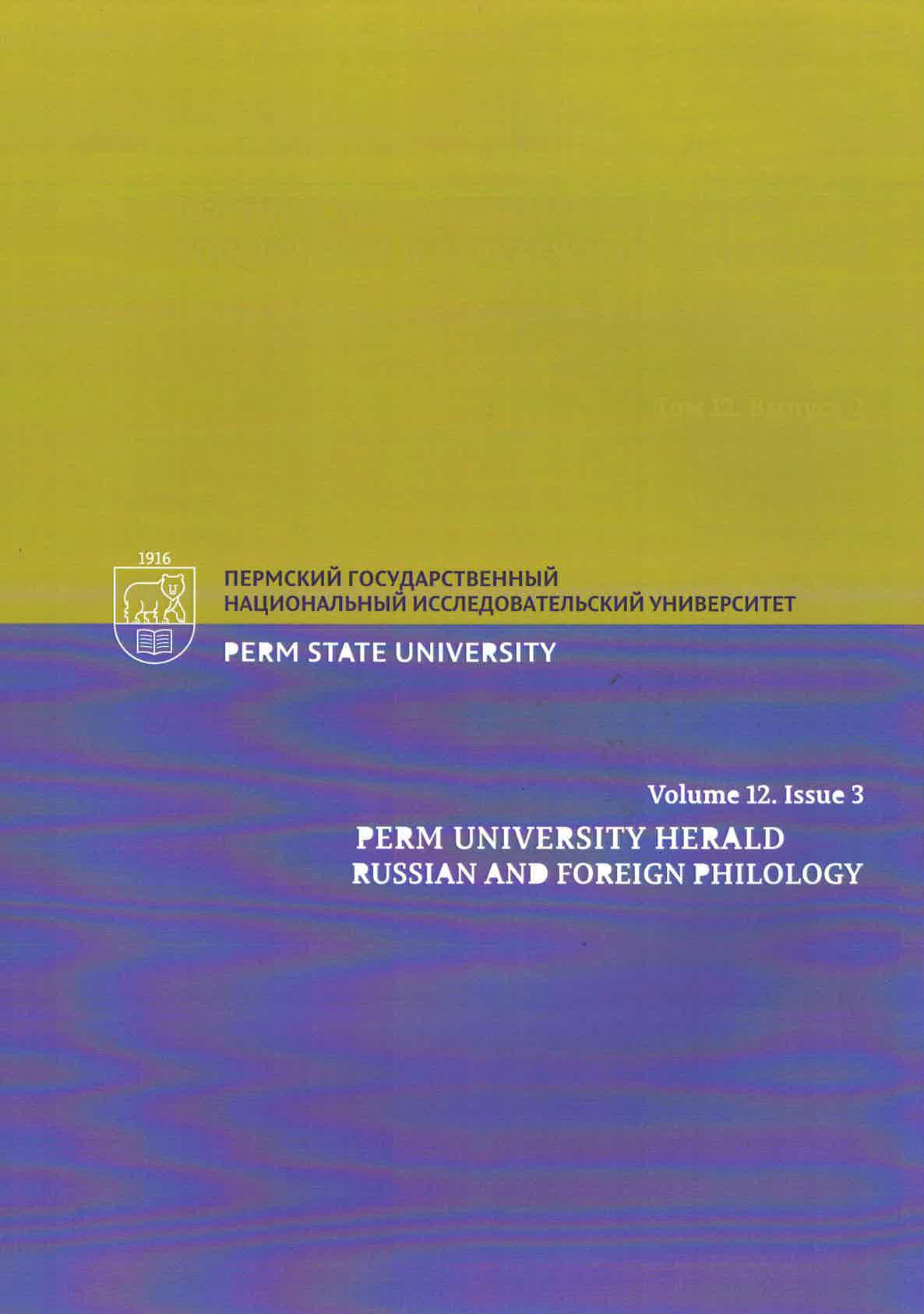REFLECTION OF LOVE RIVALRY IN DIALECT LEXIS (Based on Examples from the Russian North Dialects)
DOI:
https://doi.org/10.17072/2073-6681-2019-3-47-56Keywords:
dialect lexis, semantics, motivology, contextual analysis, ethnolinguistics, Northern Russian dialects, folk axiology, love rivalry lexis.Abstract
The article deals with language representation of such psychological and social scenario as love rivalry. Dialectal lexical items observed on the territory of the Russian North are taken as the material for the research. Particular attention is given to semantic and motivational aspects in the analysis of the chosen language facts. Furthermore, contextual analysis of couplet texts concerned with the topic under study is performed. The author notes axiological load of the notion of love rivalry in traditional society as compared to the state of language in modern cities, where competitions in sports and politics are the leading forms of opposition. There is observed a wide nominative prominence of a subject as a component of the prototype situation of rivalry, with the dominance of lexical items rendering the ‘love rivaless’ definition. Such gender modification is explained through the passive role of women in the country society in terms of the love choice. This state of affairs in traditional society makes girls get engaged into the battle for bachelors. Motivational analysis shows that the inner form of lexical items under research mainly consists of the characteristics of behavior typical of rivalesses (brusqueness, violence, etc.). Rivalry is also conceptualized through spatial images, namely an important part is given to the idea of ‘hostile’ loci (‘opposite’, ‘against something’). Love rivalry often acts as a topic for folk pieces. Couplet texts present a unique social model of a girl engaged into the battle for a bachelor. Folk perception credits the love rivaless with a particular appearance, character and features of behavior.References
Адоньева С. В. Прагматика фольклора. СПб.: Изд-во С.-Петерб. ун-та; Амфора, 2004. 312 с.
Березович Е. Л., Леонтьева Т. В. Наветка как форма символического осуждения // Живая старина. 2016. № 2(90). С. 49–52.
Березович Е. Л., Леонтьева Т. В. НАМЕК в диалектной лингвокультурной среде: жанровая разновидность частушек и лексические репрезентации понятия // Вестник Томского государственного университета. Филология. 2017. № 47. С. 5–27.
Гура А. В. Брак и свадьба в славянской народной культуре: семантика и символика. М.: Индрик, 2011. 936 с.
Еремина М. А. Лексико-семантическое поле «Отношение человека к труду» в лексике рус-ских народных говоров: этнолингвистический аспект: дис. … канд. филол. наук. Екатеринбург, 2003. 244 с.
Еремина М. А., Леонтьева Т. В., Щетини-на А. В. Галерея лингвистических портретов социальных типажей / отв. ред. Т. В. Леонтьева. Екатеринбург: Ажур, 2018. 332 с.
Зверева Ю. В. Наименования человека по отношению к браку в пермских говорах // Вестник Пермского университета. Российская и зарубежная филология. 2013. Вып. 1(21). С. 28–36.
Толстая С. М. Слав. *svoj: семантика и аксиология // Etnolingwistyka: Problemy języka i kultury. Lublin, 2008а. T. 20. S. 29–38.
Толстая С. М. Пространство слова. Лексическая семантика в общеславянской перспективе. М.: Индрик, 2008б. 528 с.
References
Adon’eva S. V. Pragmatika fol’klora [Folklore pragmatics]. St. Petersburg, St. Petersburg University Press, Amfora Publ., 2004. 312 p. (In Russ.)
Berezovich E. L., Leont’eva T. V. NAMEK v dialektnoy lingvokul’turnoy srede: zhanrovaya raznovidnost’ chastushek i leksicheskie reprezentatsii ponyatiya [HINT in dialect linguocultural environment: folklore genre and lexical representations of the notion]. Vestnik Tomskogo gosudarstvennogo universiteta. Filologiya [Tomsk State University Journal of Philology], 2017, issue 47, pp. 5–27. (In Russ.)
Berezovich E. L., Leont’eva T. V. Navetka kak forma simvolicheskogo osuzhdeniya [Navetka as a form of symbolic disapproval]. Zhivaya starina [Living Past], 2016, issue 2(90), pp. 49–52. (In Russ.)
Eremina M. A. Leksiko-semanticheskoe pole ‘Otnoshenie cheloveka k trudu̕ v leksike russkikh narodnykh govorov: etnolingvisticheskiy aspekt. Dis. kand. filol. nauk [Lexico-semantic field ‛Human attitude to work’ In Russian dialectal lexis: ethnolinguistic aspect. Cand. philol. sci. diss.]. Ekaterinburg, 2003. 244 p. (In Russ.)
Eremina M. A., Leont’eva T. V., Shchetinina A. V. Galereya lingvisticheskikh portretov sotsial’nykh tipazhey [Gallery of linguistic pictures of social models]. Ed. by T. V. Leont’eva. Ekaterinburg, Azhur Publ., 2018. 332 p. (In Russ.)
Gura A. V. Brak i svad’ba v slavyanskoy narodnoy kul’ture: semantika i simvolika [Marriage and wedding in Slavic folk culture: semantics and symbolism]. Moscow, Indrik Publ., 2011. 936 p. (In Russ.)
Tolstaya S. M. Prostranstvo slova. Leksicheskaya semantika v obshcheslavyanskoy perspective [Word space. Lexical semantics in common-Slavic perspective]. Moscow, Indrik Publ., 2008. 528 p. (In Russ.)
Tolstaya S. M. Slav. *svoj: semantika i aksiologiya [The Slavic root *svoj-‛(one’s) own̕: its semantics and axiology]. Etnolingwistyka: Problemy języka i kultury [Ethnolinguistics. Problems of Language and Culture], 2008, issue 20, pp. 29–38. (In Russ.)
Zvereva Yu. V. Naimenovaniya cheloveka po otnosheniyu k braku v permskikh govorakh [Man nomination in the aspect of marriage in Perm dia-lects]. Vestnik Permskogo universiteta. Rossiyskaya i zarubezhnaya filologiya [Perm University Herald. Russian and Foreign Philology], 2013, issue 1(21), pp. 28–36. (In Russ.)




